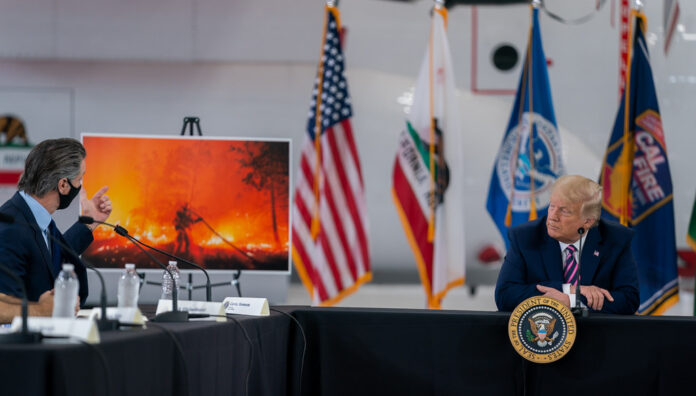By Sally C. Pipes
Many elected officials have told Americans for months to stay home and forego everything from religious gatherings and team sports to holiday dinners and even funerals to stem the spread of the coronavirus. And yet we keep seeing news reports about officials flouting their own rules with a nice dinner out or a trip.
The rules just don’t seem to apply to America’s political class. Their refusal to abide by their own guidance is sowing chaos, uncertainty and resentment during a historic national crisis.
Just before Thanksgiving, as COVID-19 case rates were rising across the Golden State, California Gov. Gavin Newsom was spotted at a well-attended birthday party for a prominent lobbyist at The French Laundry, a high-end, Michelin three-star restaurant in the Napa Valley.
Photos from the event showed the Democratic governor dining without a mask at a crowded table — even as he asked Californians to avoid gatherings with anyone outside of their household.
Newsom has taken a lot of grief for his decision. Perhaps his announcement this week of a framework for a new stay-at-home order that will be based on the availability of intensive care units in five regions across the state is a form of penance.
A day after Newsom’s evening in wine country, San Francisco Democratic Mayor London Breed attended another lavish birthday party at the same restaurant. Breed went on to issue a strict indoor dining prohibition in her own city just three days later.
Last week, Democratic Los Angeles County Supervisor Sheila Kuehl dined at an Italian restaurant in Santa Monica. Her meal came just a few hours after she voted to ban outdoor dining across the city.
This sort of hypocrisy isn’t limited to California, of course. Not long after imploring residents of the District of Columbia not to cross state lines, Democratic Mayor Muriel Bowser traveled to Delaware — a state with higher coronavirus case rates — to attend a victory celebration for President-elect Joe Biden. She defended the decision by deeming the trip “essential travel.”
Steve Adler — the Democratic mayor of Austin, Texas — recorded a video urging people to stay home in early November, while he was on vacation in Cabo San Lucas, Mexico.
Democratic Denver Mayor Michael Hancock visited family in Mississippi for Thanksgiving. Thirty minutes before his flight took off, his Twitter account urged people not to travel for the holiday.
New York Gov. Andrew Cuomo, another Democrat, announced plans to have his 89-year-old mother and two of his daughters over to his home for Thanksgiving, despite asking New Yorkers not to travel for the holiday. The governor justified his decision by saying, “I didn’t want to disappoint my mother.” However, he eventually canceled the gathering after a public backlash.
That so many of our political leaders have been unwilling to make the sacrifices they’re calling on everyone else to make in the name of quelling this pandemic is infuriating. But it also makes an effective COVID-19 response strategy that much harder to enact.
What are ordinary Americans supposed to make of stay-at-home directives that those in charge don’t follow? What are folks whose businesses or jobs are deemed “non-essential” by the government supposed to do to put food on the table or cover their rent or mortgage payments? Which orders do we have to follow, and which do the politically connected get to ignore?
Any successful plan for ending this pandemic will require Americans to trust their government officials. For that to happen, leaders at all levels of government need to start practicing what they preach, even if it means curtailing their social lives, canceling a vacation, or disappointing their mothers.
Originally published by the California Political Review. Republished with permission.











